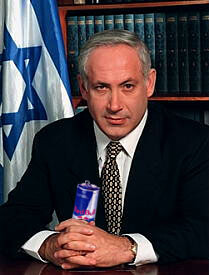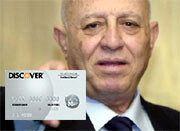15 December 2003

“Look, let’s face it — the hope that Oslo once presented has evaporated. We all know we are in this for the long haul. There will be no quick fixes. So, why should we let CNN, the other news channels and the military contractors take all of the profits?” declared Israeli Finance Minister Benjamin Netanyahu at yesterday’s new conference, sipping a Red Bull energy drink (Red Bull is hoping to draw on the importance of its biblical predecessor, the red heifer, to become the official drink of the Israeli Civil Administration.).
“So, we have gotten together with the Palestinians — that Economic Minister really is something, no wonder the Americans love him — and said, hey, let’s bring in some big companies and let them claim some of this balagan as their own, paying us in the process.”

The controversy over which credit card would become the official Palestinian credit card highlights the complex and sensitive nature of this new initiative. At first, industry insiders report, Visa had the inside track. This advantage was eventually lost over a slogan. Visa’s current slogan is “It’s everywhere you want to be.” But, due to the restrictive policies on movement and curfew imposed by Israel in the Occupied Territories, most Palestinians are not, in fact, where they want to be. Unwilling to compromise on its slogan, Visa dropped out.
The same was true for MasterCard. The MasterCard “priceless” advertisements have become ubiquitous throughout the world. But, given the depressing situation throughout most of the Palestinian territories, no acceptable “priceless” ad was ever conceived. And that left Discover.
The possibilities in other markets and industries, such as fast food, are endless. According to reports, Dunkin’ Donuts, Blimpie and Pizza Hut have all submitted bids to the Civil Administration for the right to checkpoint refreshments. Although the random nature of where checkpoints appear, and for how long, could pose logistical difficulties, particularly for larger cooking equipment, each of the three chains claimed to be committed to the idea. “Much has been made of the difficulty faced by Palestinians at the checkpoints,” said Dunkin’ Donuts spokesman Roger Watson.

Other chains, led by Subway, have chosen instead to cozy up to the Palestinians. The speculation is that, although short-term profit prospects within the Palestinian-controlled areas are somewhat bleaker than they would be on the Israeli side, the prospect of obtaining concession rights to the Haram el-Sharif, over which Palestinians are likely to be granted sovereignty in an eventual peace agreement, is simply too much to pass up.
For its part, the Yesha Council, the governing body of the Israeli settlements, has accepted a bid from Wal-Mart to anchor the new “Separation Mall,” a group of stores that will be open only to the Jewish residents of the West Bank. (Requests for information on who would staff the cleaning operations of the Mall were not answered by Wal-Mart.)

Wal-Mart was able to finally close the Separation Mall deal after closing its meat cutting operations worldwide. Although this move was in apparent response to the first department of employees to unionize within the company — a meat cutting department at a store in Texas — it also meant that all concerns over kosher dietary requirements within the store instantly disappeared.
Other scenarios border on the absurd. PA Information Minister Yasser Abed-Rabbo would neither confirm nor deny reports that Yasser Arafat has been seen throughout his compound, known as the Muqata’a, on a cell phone asking “Can you hear me now?” Spokesmen form Verizon, citing Arafat’s declining health, have denied the report, dubious that Arafat could either hear responses clearly or perform the service once outside his compound. “Sounds like we will be stuck with that annoying guy from American TV,” bemoaned one Palestinian after hearing the report. “He’s worse than the Energizer bunny.”
Of course, each corporation involved has issued a press release with an obligatory statement that it hopes for a peaceful resolution to the conflict, condemns violence and does not seek to profit from the misery of the people in the region. As with most such initiatives, Netanyahu has demanded that all payments to the Palestinians come through Israel, which will release the funds after ensuring they will not be used to support terrorism. Prime Minister Qureia has threatened to resign over the Israeli move.
The White House, busy staving off growing criticism of “Operation Iraqi Freedom, presented by DynCorp and Halliburton” has not commented on the story thus far.